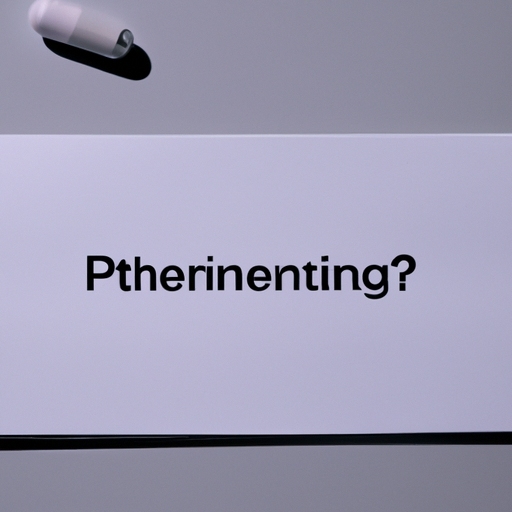
What Is Phentermine?
Best Over The Counter Phentermine Alternative?
Our #1: PhenQ
Looking to achieve your weight loss goals naturally, safely, and affordably? PhenQ might just be what you need.
As an effective and natural alternative to Phentermine, PhenQ can help you shed those extra pounds without any side effects. Even better, it's more budget-friendly than its prescription counterpart.
Visit their website:
PhenQ.com
-
Contents
Table of Contents
Phentermine is a prescription medication used to treat obesity. It is a stimulant that works by suppressing the appetite and increasing energy levels. It is usually prescribed for short-term use, as long-term use can lead to dependence and addiction. Phentermine is one of the most commonly prescribed weight loss medications in the United States. It is important to understand the potential risks and side effects associated with this medication before taking it.
How Phentermine Works to Help You Lose Weight
Phentermine is a prescription medication used to help people lose weight. It is a stimulant that works by suppressing the appetite and increasing energy levels. Phentermine works by stimulating the hypothalamus gland, which is responsible for controlling hunger and satiety signals. It also increases the release of certain neurotransmitters, such as norepinephrine and dopamine, which can help reduce hunger and cravings.
Phentermine is typically prescribed for short-term use, usually no longer than 12 weeks. It is important to note that phentermine is not a miracle drug and should be used in conjunction with a healthy diet and exercise program. It is also important to follow the instructions of your doctor when taking phentermine.
When taking phentermine, it is important to remember that it is not a substitute for healthy eating and exercise. It is important to maintain a healthy lifestyle while taking phentermine in order to maximize its effectiveness. Additionally, it is important to remember that phentermine is not a long-term solution for weight loss and should not be used as such.
Phentermine can be an effective tool for weight loss when used correctly. It is important to remember to follow the instructions of your doctor and maintain a healthy lifestyle while taking phentermine in order to maximize its effectiveness.
The Benefits and Risks of Taking Phentermine
Phentermine is a prescription medication used to treat obesity. It is a stimulant that suppresses appetite and increases energy levels. While it can be an effective tool in helping people to lose weight, it is important to understand the potential benefits and risks associated with taking this medication.
The primary benefit of taking phentermine is that it can help people to lose weight. It works by suppressing appetite and increasing energy levels, which can help to reduce caloric intake and increase physical activity. This can lead to significant weight loss over time. Additionally, phentermine can help to reduce the risk of developing obesity-related health conditions, such as type 2 diabetes, heart disease, and stroke.
However, there are also potential risks associated with taking phentermine. Common side effects include dry mouth, insomnia, constipation, and dizziness. In rare cases, it can also cause more serious side effects, such as chest pain, irregular heartbeat, and difficulty breathing. Additionally, phentermine can be habit-forming and should not be taken for longer than prescribed.
It is important to discuss the potential benefits and risks of taking phentermine with your doctor before starting the medication. Your doctor can help you to determine if phentermine is the right choice for you and can provide guidance on how to use it safely and effectively.
How to Use Phentermine Safely and Effectively
Phentermine is a prescription medication used to help people lose weight. It is important to use phentermine safely and effectively in order to maximize its benefits and minimize any potential risks. Here are some tips for using phentermine safely and effectively.
1. Follow your doctor’s instructions. It is important to follow your doctor’s instructions when taking phentermine. This includes taking the correct dosage, taking it at the right time, and not taking more than prescribed.
2. Monitor your progress. Keep track of your weight and other health indicators such as blood pressure and cholesterol levels. This will help you and your doctor determine if the medication is working and if any adjustments need to be made.
3. Eat a healthy diet. Phentermine is not a substitute for a healthy diet. Eating a balanced diet that is low in calories and high in fiber is essential for weight loss.
4. Exercise regularly. Exercise is an important part of any weight loss program. Aim for at least 30 minutes of moderate physical activity most days of the week.
5. Avoid alcohol. Alcohol can interfere with the effectiveness of phentermine and can increase the risk of side effects.
6. Talk to your doctor. If you experience any side effects or have any questions or concerns about taking phentermine, talk to your doctor.
By following these tips, you can use phentermine safely and effectively to help you reach your weight loss goals.
Common Side Effects of Phentermine and How to Manage Them
Phentermine is a prescription medication used to treat obesity. It is a stimulant that suppresses appetite and increases energy levels. While it can be an effective tool in weight loss, it can also cause some side effects. It is important to be aware of these side effects and how to manage them.
The most common side effects of phentermine include dry mouth, insomnia, constipation, headache, and dizziness. To manage dry mouth, it is important to drink plenty of water throughout the day. Chewing sugar-free gum or sucking on sugar-free hard candy can also help. To help with insomnia, it is important to maintain a regular sleep schedule and avoid caffeine and alcohol close to bedtime. To manage constipation, it is important to increase fiber intake and drink plenty of fluids. For headaches, it is important to take over-the-counter pain relievers as needed. For dizziness, it is important to avoid activities that require alertness until the symptoms subside.
Other less common side effects of phentermine include increased heart rate, high blood pressure, and restlessness. If you experience any of these symptoms, it is important to contact your doctor immediately.
It is important to be aware of the potential side effects of phentermine and how to manage them. If you experience any side effects that are severe or persistent, it is important to contact your doctor.
What to Know Before Taking Phentermine: A Guide for Beginners
Before taking phentermine, it is important to understand the potential risks and benefits associated with the medication. This guide will provide an overview of what to know before taking phentermine, including potential side effects, drug interactions, and precautions.
What is Phentermine?
Phentermine is a prescription medication used to treat obesity. It is a stimulant that works by suppressing appetite and increasing energy levels. It is typically prescribed for short-term use, usually no longer than 12 weeks.
Potential Side Effects
Phentermine can cause a variety of side effects, including dry mouth, insomnia, constipation, and increased heart rate. It can also cause more serious side effects, such as chest pain, difficulty breathing, and an irregular heartbeat. If you experience any of these side effects, contact your doctor immediately.
Drug Interactions
Phentermine can interact with other medications, including antidepressants, blood pressure medications, and diabetes medications. It is important to tell your doctor about all medications you are taking before starting phentermine.
Precautions
Phentermine should not be taken by pregnant or breastfeeding women, or by people with certain medical conditions, such as heart disease, high blood pressure, glaucoma, or an overactive thyroid. It should also not be taken by people who have a history of drug abuse or addiction.
Conclusion
Phentermine can be an effective treatment for obesity, but it is important to understand the potential risks and benefits before taking it. Be sure to talk to your doctor about any medications you are taking and any medical conditions you have before starting phentermine.
Q&A
Q1: What is Phentermine?
A1: Phentermine is a prescription medication used to treat obesity. It is an appetite suppressant that works by affecting the central nervous system.
Q2: How does Phentermine work?
A2: Phentermine works by stimulating the hypothalamus gland and affecting certain neurotransmitters to decrease appetite and increase energy levels.
Q3: What are the side effects of Phentermine?
A3: Common side effects of Phentermine include dry mouth, insomnia, constipation, dizziness, and increased heart rate.
Q4: Is Phentermine safe?
A4: Phentermine is generally safe when taken as prescribed by a doctor. However, it can be habit-forming and should not be taken for longer than prescribed.
Q5: How long does Phentermine take to work?
A5: Phentermine usually starts to work within a few hours of taking it. However, it may take several weeks to see the full effects.In conclusion, Phentermine is a prescription medication used to treat obesity and weight-related conditions. It works by suppressing the appetite and increasing energy levels, allowing users to reduce their caloric intake and lose weight. While it can be effective in helping people lose weight, it is important to remember that it should only be used under the supervision of a doctor and should not be used as a substitute for healthy lifestyle changes.


